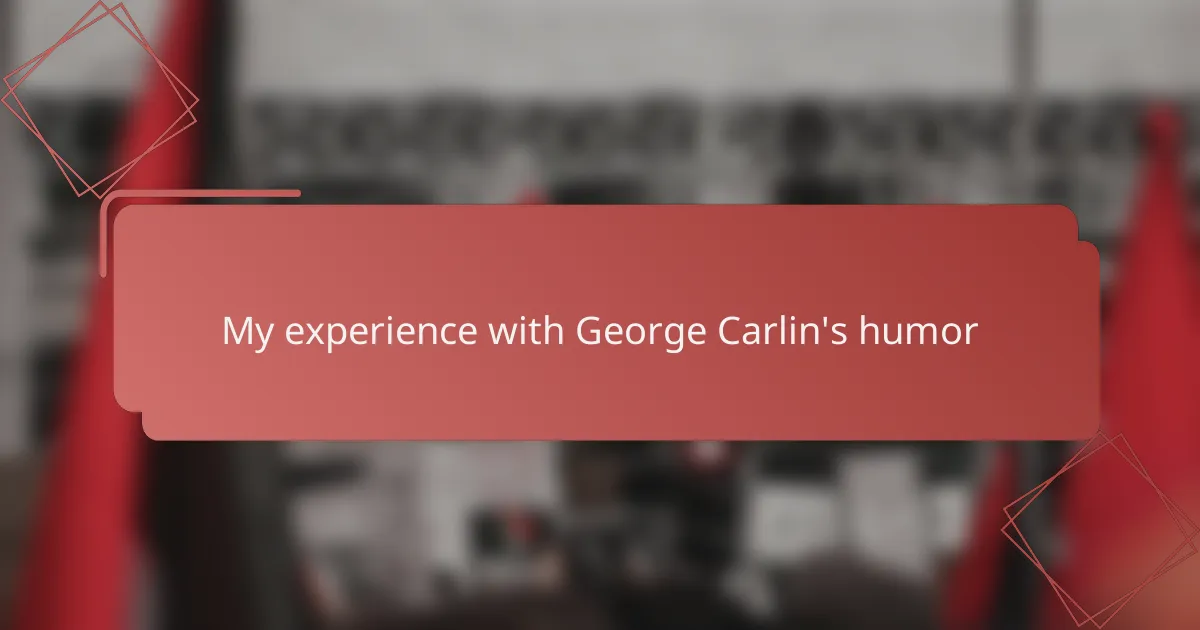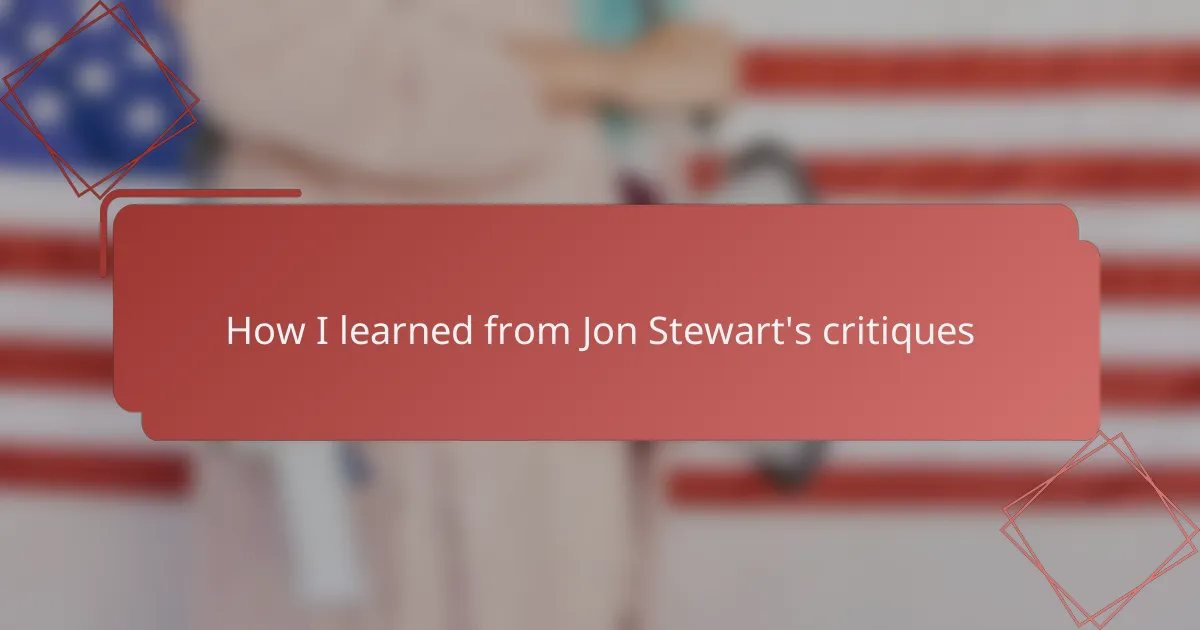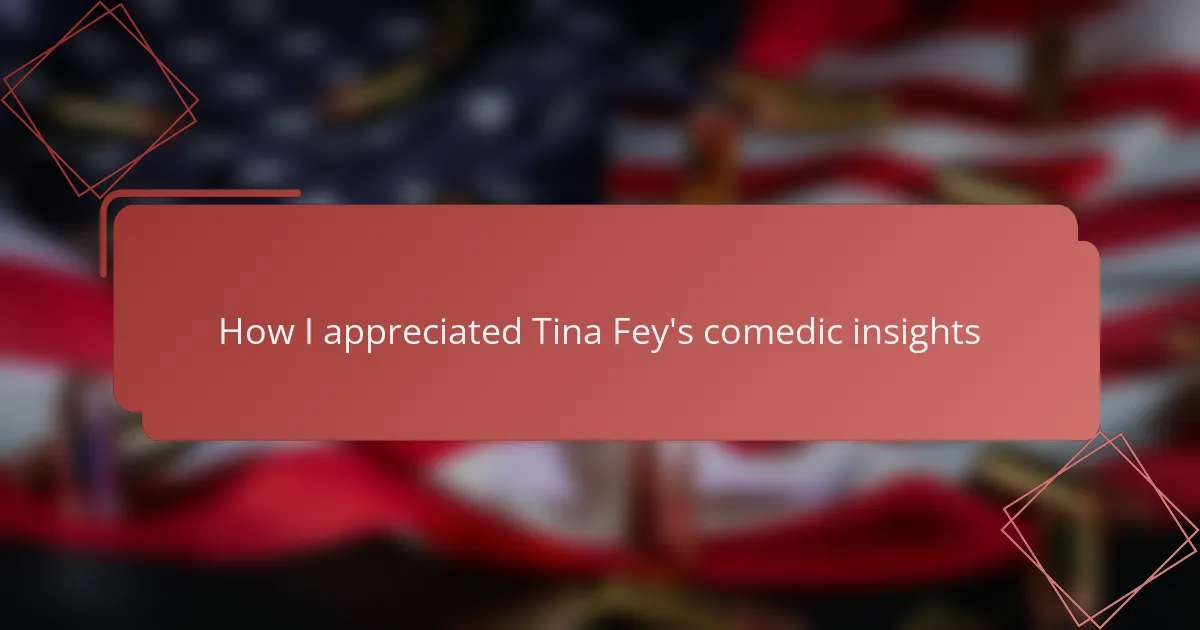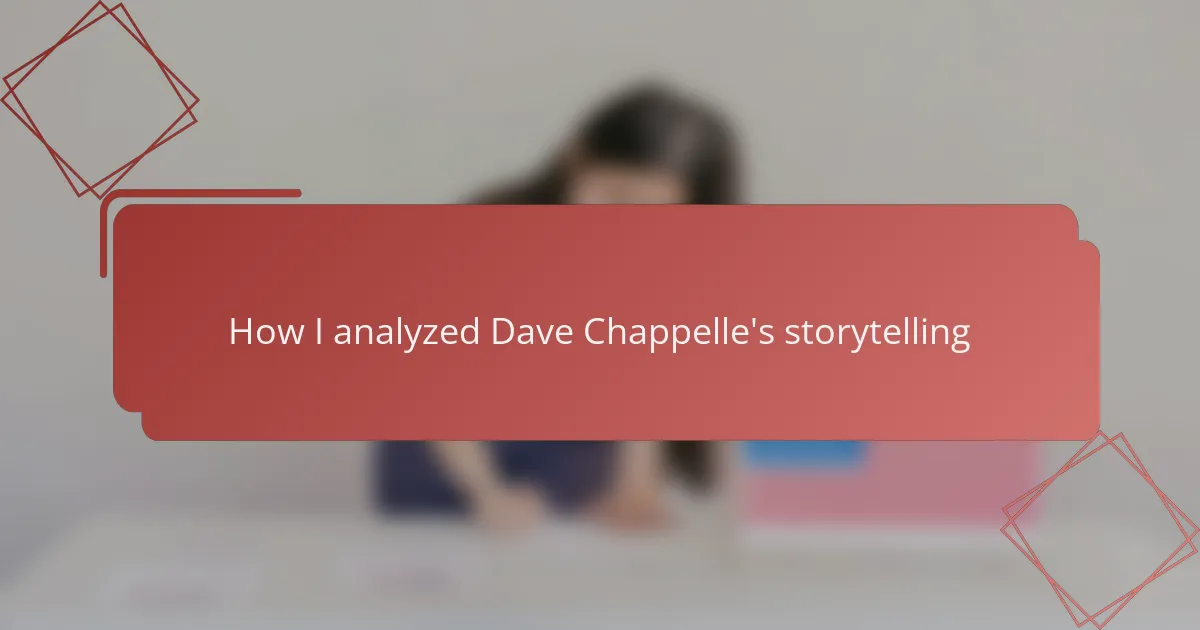Key takeaways
- Political satire uses humor to critique societal and political absurdities, engaging audiences in thoughtful reflection.
- George Carlin’s fearless style blended sharp irony with social critique, challenging viewers to reconsider their beliefs and the language used in politics.
- His humor exposed power structures and social injustices, encouraging a more skeptical and critical engagement with political discourse.
- Carlin’s approach highlighted the importance of balancing humor with serious critique, allowing for deeper conversations about uncomfortable truths.

Understanding political satire basics
Political satire, at its core, uses humor to critique and expose the absurdities within politics and society. From my experience, grasping its basics helped me appreciate George Carlin’s humor even more, as he masterfully balanced sharp wit with deep social commentary. I remember the first time I realized satire could be both hilarious and painfully truthful—it changed how I viewed comedy forever.
| Aspect | Explanation |
|---|---|
| Purpose | To critique politics and societal flaws through humor |
| Methods | Irony, exaggeration, parody, and sarcasm |
| Effect | Engages audience by provoking thought and laughter simultaneously |
| Emotional Impact | Often mixes amusement with discomfort, highlighting uncomfortable truths |
| Personal Connection | Helps me reflect on the world while enjoying a smart laugh |
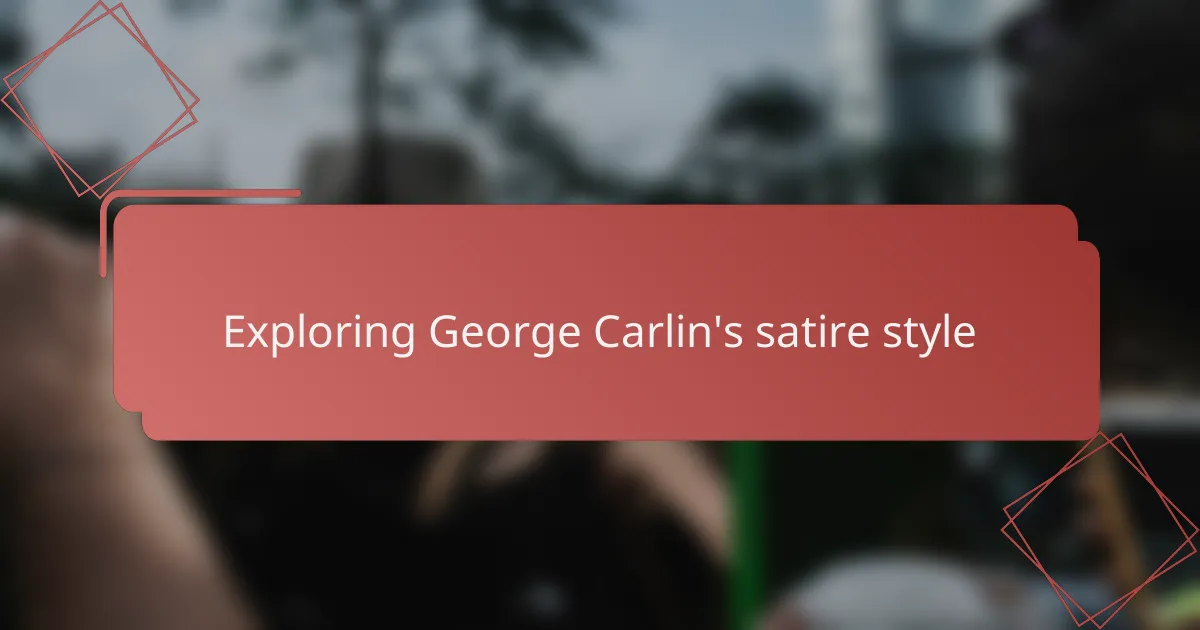
Exploring George Carlin’s satire style
George Carlin’s satire style always struck me as fearless and unapologetically honest. He didn’t just point out flaws—he grabbed them by the collar and shook them, using sharp irony and clever wordplay to pull back the curtain on societal hypocrisies. Have you ever heard a joke that makes you laugh and cringe at the same time? That’s classic Carlin.
What fascinated me most was how he layered his humor. One minute he’d be riffing on everyday absurdities, the next, he’d dive into biting social critique that made me pause and reconsider what I thought I knew. It felt like a personal conversation challenging my assumptions, rather than just a performance.
His use of sarcasm and exaggeration wasn’t just for laughs; it was a strategic toolkit to expose uncomfortable truths. From my experience, Carlin’s satire wasn’t simply about mocking—it was about making the invisible visible in the most entertaining way possible. Isn’t that the power true satire should have?
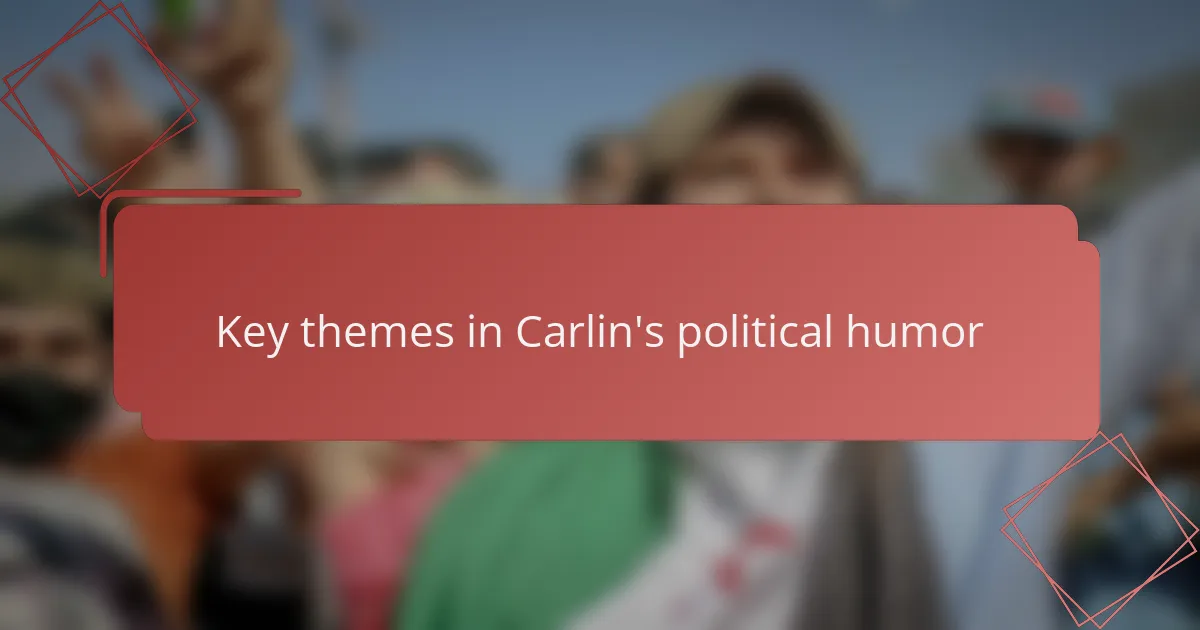
Key themes in Carlin’s political humor
One of the key themes I noticed in Carlin’s political humor is his relentless scrutiny of power structures. He never spared politicians or institutions, often exposing their contradictions and failures with biting clarity. I’ve found that this fearless approach forces us to confront uncomfortable realities we might otherwise ignore.
Another theme that stood out to me was Carlin’s focus on language and its manipulation in politics. He dissected political jargon like a surgeon, showing how words are twisted to obscure truth or manipulate public opinion. Reflecting on this made me more aware of the subtle tricks used in everyday political discourse.
Finally, Carlin’s humor frequently tackled social inequality and injustice. He used satire to highlight how policies and societal norms often marginalize certain groups. Whenever I hear his routines on this, I’m reminded that humor can be a powerful tool for empathy and social awareness, sparking both laughter and reflection.
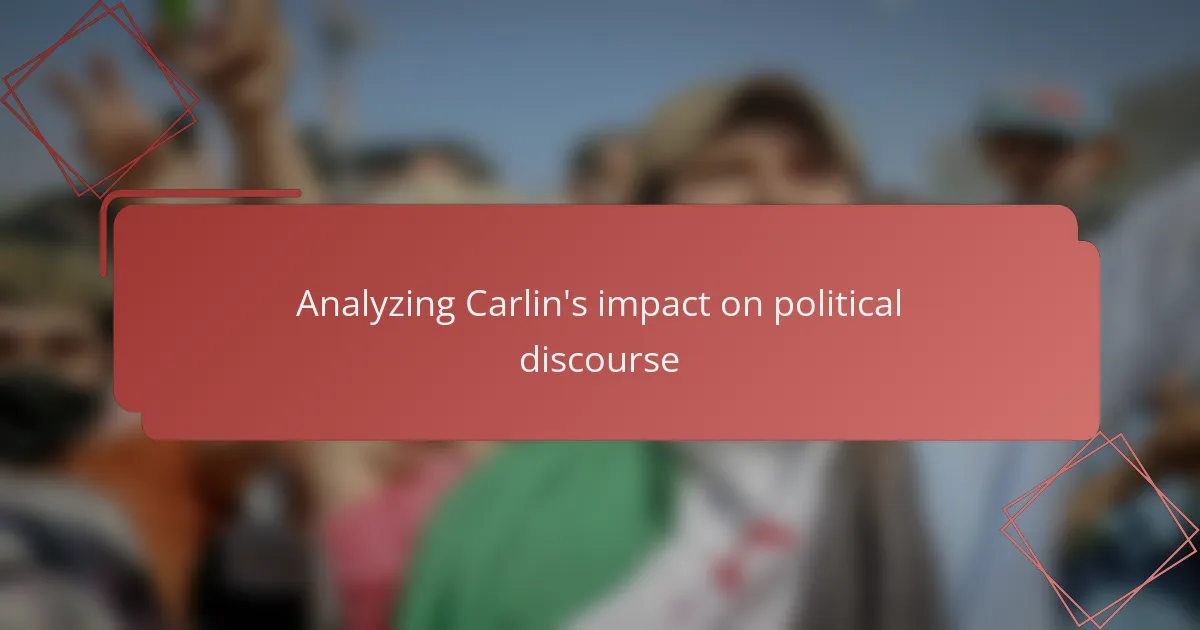
Analyzing Carlin’s impact on political discourse
George Carlin’s humor didn’t just make me laugh; it made me think deeply about the absurdities in our political system. His sharp critiques cut through the noise, exposing hypocrisy with a mix of wit and fearless honesty that I found both refreshing and unsettling. I remember watching one of his specials during a turbulent election season and feeling oddly empowered to question mainstream narratives.
What struck me most about Carlin was how his satire encouraged people, including myself, to engage more critically with political discussions rather than passively accept them. Here’s how I believe his humor impacted political discourse:
- Challenged conventional wisdom by pointing out contradictions and double standards in politics
- Used comedy as a tool to make complex political issues accessible and relatable
- Provoked uncomfortable but necessary conversations around power and authority
- Inspired a more skeptical and questioning attitude among his audience
- Highlighted the absurdity of partisan extremes with clever, thought-provoking jokes
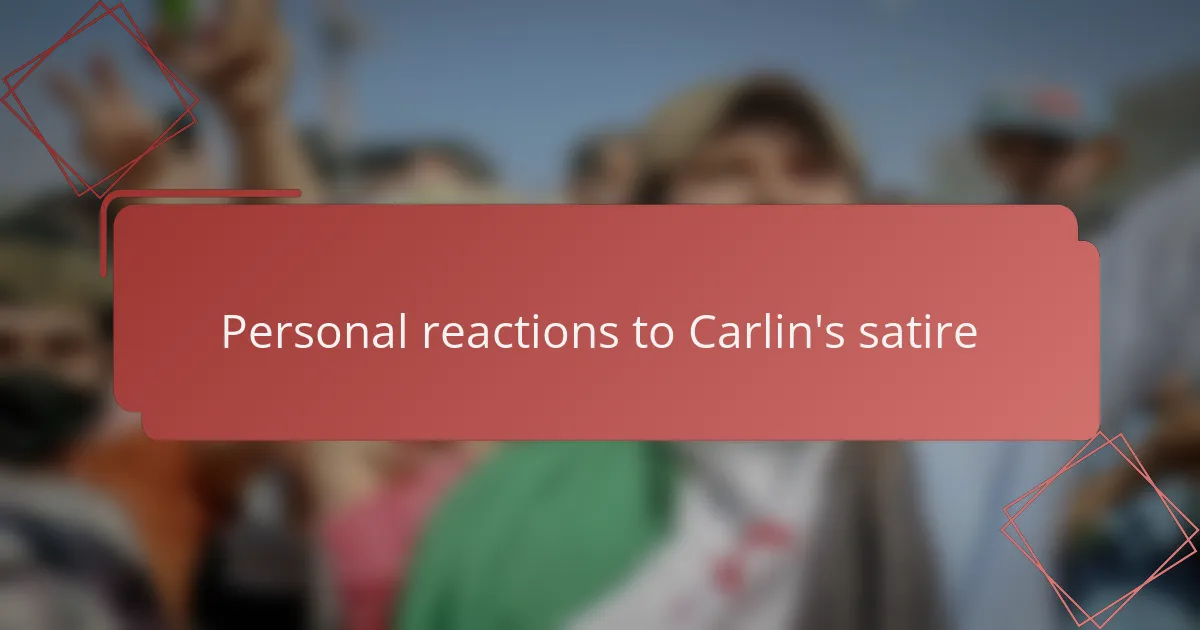
Personal reactions to Carlin’s satire
There were moments when Carlin’s satire caught me completely off guard—his humor was so direct that it almost felt like he was challenging me personally. Have you ever laughed at something and then realized it hit a nerve? That’s exactly how his jokes made me feel, blending amusement with a sharp sting of reality.
Sometimes, I found myself nodding along in agreement, only to suddenly feel uncomfortable as his satire plunged deeper into topics I hadn’t fully thought through before. It was like a mental workout, pushing me to question my own beliefs while still enjoying the clever wordplay and timing. This mix of laughter and self-reflection is something I deeply appreciated.
What impressed me most was how Carlin’s humor didn’t just entertain—it sparked genuine introspection. I often caught myself replaying a line days later, still unpacking the layers of meaning beneath the laughter. It made me wonder: how rare is it for comedy to challenge us so effectively without losing its edge? From my experience, Carlin nailed that balance every time.
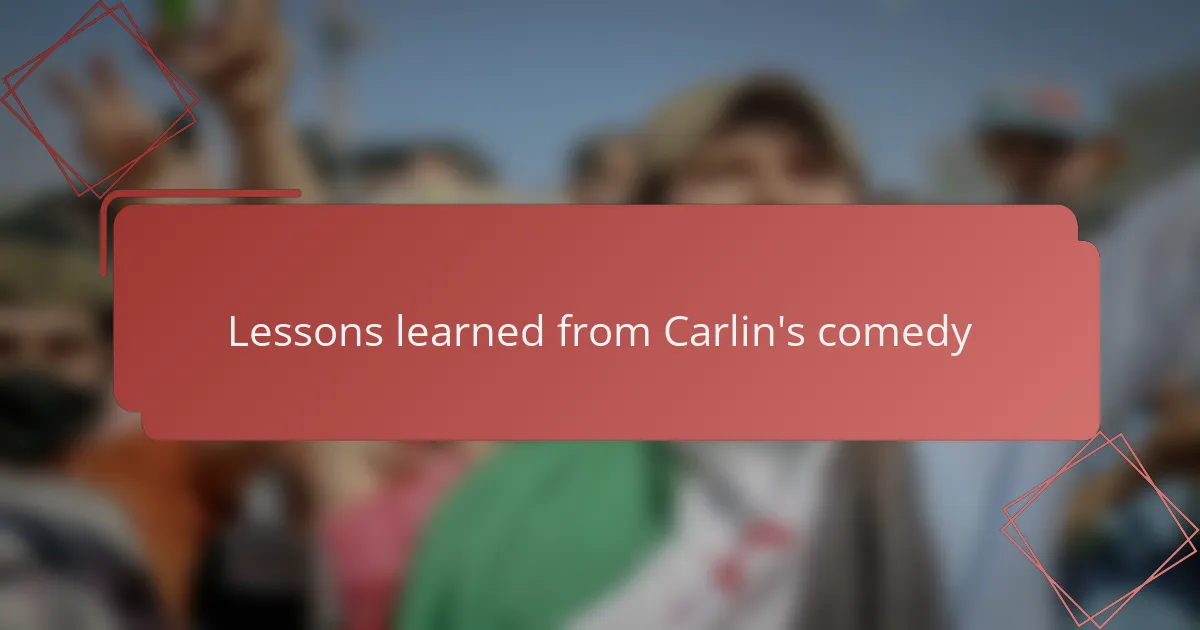
Lessons learned from Carlin’s comedy
I’ve found that George Carlin’s humor taught me the power of speaking truth to power with wit. His ability to dissect political absurdities made me realize how comedy can expose uncomfortable truths while still engaging an audience. One moment that stuck with me was his take on language—how carefully chosen words can shape public perception and political debate.
| Lesson from Carlin | Impact on My Understanding of Political Satire |
|---|---|
| Using Language Precisely | Helped me see the role of wordplay in political critique |
| Challenging Authority | Encouraged me to question political narratives boldly |
| Balancing Humor and Criticism | Showed how laughter can make tough topics more approachable |
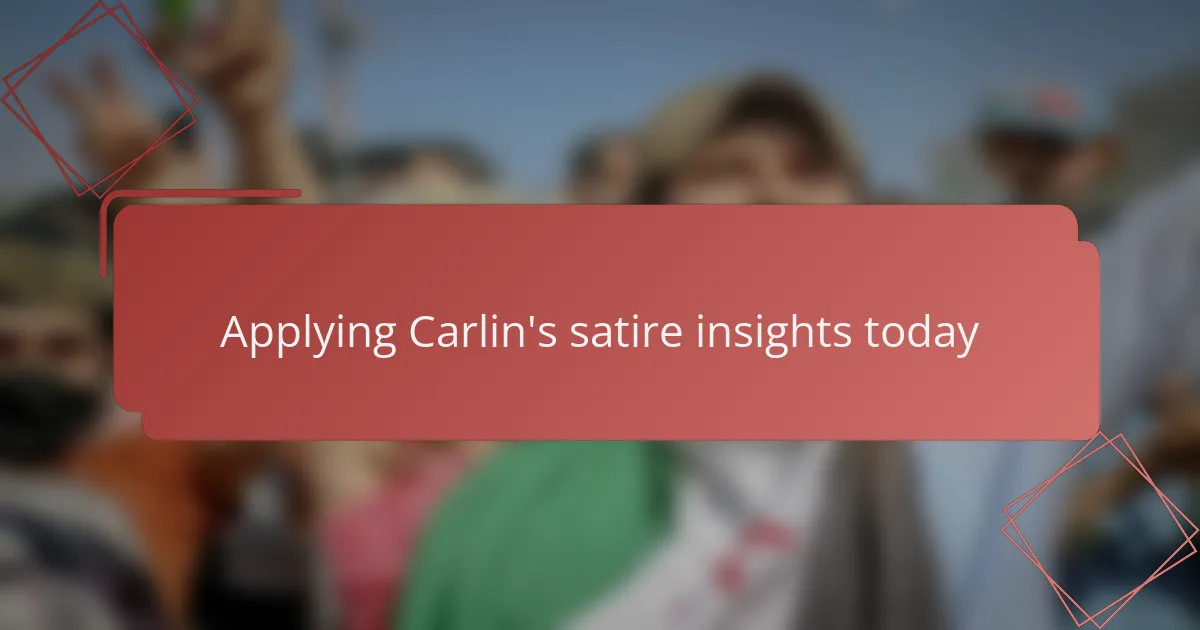
Applying Carlin’s satire insights today
Applying Carlin’s satire insights today feels incredibly relevant, especially when I see how political spin and buzzwords still cloud public discourse. I often catch myself recalling his knack for exposing language tricks—have you noticed how politicians recycle empty phrases? It’s like Carlin gave me a lens to see through that fog, making me question what’s really being said versus what’s just noise.
What I appreciate most is how Carlin’s fearless approach to challenging authority pushes me to stay curious and skeptical in a world that often prefers easy answers. Sometimes, it’s uncomfortable, almost like he’s nudging me out of complacency, but isn’t that exactly what effective satire should do? From my experience, applying this mindset helps me engage with current events more critically without losing my sense of humor.
Also, Carlin’s balance of sharp critique and laughter reminds me to approach political conversations with both seriousness and levity. When things get tense or frustrating, I think about how he used humor to make harsh truths accessible, sparking reflection rather than shutting down dialogue. It makes me wonder—could adopting that tone help us all communicate better today?
